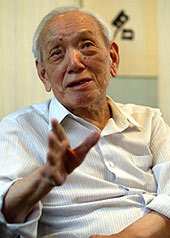Berkeleyan
Obituary
Shiing-Shen Chern
![]()
08 December 2004
 Shiing-Shen Chern (China Daily photo) |
In the 1930s and ’40s, Chern took the then-dormant field of differential geometry, which dealt with the mathematical description of geometric figures, and turned it into a vibrant area of study delving into the geometry of many dimensions and merging ultimately with the study of algebraic geometry and topology. Today, the fields on which he had the greatest impact — global differential geometry and complex algebraic geometry — are fundamental to many areas of mathematics and theoretical physics.
Chern, who became a U.S. citizen in 1961, joined Berkeley’s mathematics department in 1960 and retired in 1979, only to return as cofounder and first director of the Mathematical Sciences Research Institute (MSRI), the largest and most prominent math institute in the world. The building on the Berkeley campus housing the institute, which he directed from 1981 until 1984, will be named Chern Hall upon the completion of a new addition in late 2005.
A major gift from Chern sparked MSRI’s successful campaign to expand its building, and when Chern was honored earlier this year with Hong Kong’s $1 million Shaw Prize for Mathematics, he gave MSRI a large additional gift from the proceeds.
MSRI was one of three mathematics institutes he founded during his 70-year career. In China, he established the Institute of Mathematics of the Academia Sinica, building it from the ground up in the 1940s and ’50s. Chern also founded in 1984 the Nankai Institute of Mathematics at Nankai University in Tianjin, which built a home on the campus a short distance away so that Chern, by then in a wheelchair, could come to work every day. Still active in mathematics at the time of this death, Chern was honorary director of the institute.
Chern was born in Kashing, Chekaing Province, China, on Oct. 26, 1911. He became interested in mathematics while in high school, and eventually majored in mathematics after enrolling in Nankai University at the age of 15. He obtained a master’s in mathematics in 1934 and a doctorate two years later; after a year of study at the Sorbonne, he taught at various institutions in China before leaving to study at the Institute for Advanced Study in Princeton, N.J. In the late 1940s he went back to China for several years, then returned to the U.S. — first accepting a position at the University of Chicago, where he taught from 1949 until 1960, then coming to Berkeley.
A recipient of the 1983-84 Wolf Prize in mathematics, the equivalent of the Nobel Prize, he also received the U.S. National Medal of Science in 1975 and was elected in 1961 to the National Academy of Sciences. Among his many other honors were the German Humbolt Award in 1982, the Steele Prize of the American Mathematical Society in 1983, and the Chauvenet Prize of the Mathematical Association of America in 1970. He held six honorary degrees and was a fellow or member of many organizations around the world. The International Astronomical Union named an asteroid after him last month.
His wife, Shih-ning (Cheng) Chern, whom he married in Kunming in 1939, died four years ago. He is survived by son, Paul, of Needham, Mass., and daughter, May Chu, of Houston, Texas.
A memorial service has been scheduled at Nankai University on Dec. 12, and a memoriam is pending at Berkeley.
— Robert Sanders

